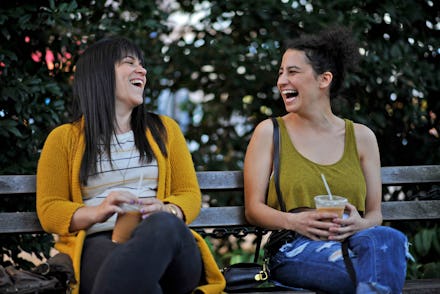The Most Important Relationship May Be the One Valentine's Day Overlooks

"If you don't have a significant other, you're missing out on the best parts of life" is pretty much the message sent en masse when Valentine's Day rolls around. But it's not just on V-Day — all year long, it's romantic relationships that get the spotlight.
But what about friendships?
From anniversaries and weddings to recognized milestones like moving in together or having a child, romantic connections are celebrated publicly and often. By contrast, there are few adult traditions meant to honor friendships. The only established celebration we have might be the bachelor/bachelorette party, and even that is actually honoring a romantic relationship.
But there's a reason we've hacked together our own holidays, like Friendsgiving: Friendships are some of the most valuable relationships we have, even (or especially) as adults. Underrating just how vital these relationships are for long-term happiness makes it harder to prioritize and maintain them.
Grown-up life makes it hard to focus on friends: The rhythm and societal norms of adulthood in Western society simply don't make much space for friendship. It's not only the lack of celebrations devoted to friendship milestone moments, although that's crucial. The first time you meet your best friend's family or the first time you take care of your friend after he gets a little too drunk — such anniversaries rarely get any recognition by mainstream society (Hallmark doesn't make many friendiversary cards), meaning we aren't in the habit of marking them ourselves.
It also has to do with how we conceptualize work-life balance, with "life" encompassing family and significant others. When we say "loved ones," it's assumed to include blood relatives or spouses only. You win pity from coworkers when going through a romantic breakup, but rarely a tough patch with friends. And forget how many BFFs are currently enriching your life and occupying your time — when you lack a significant other, you're still "single."
As Ann Friedman wrote eloquently for the Cut, these cultural priorities have "real consequences. Need to leave work early because your good friend is going through a tough time and needs some one-on-one with you? Try getting that explanation past your boss."
Friends are actually good for you: Ironically, hanging out with your friend is a perfectly valid excuse for a personal health day, as our friendships actually affect our mental health. One analysis of social connections and mortality, led by Brigham Young University psychologists, looked at more than 148 studies and found that participants with stronger social relationships were 50% more likely to survive over the studies' given periods than those with fewer friendships.
In other words, not prioritizing friendships is a comparable risk to smoking 15 cigarettes a day.
Those huge numbers are supported by other scientists. Bella DePaulo, a visiting psychology professor at the University of California, Santa Barbara, told the New York Times that in many studies, friends have "an even greater effect on improving health than a spouse or family member." Even the Mayo Clinic suggests friendships are linked to health improvements ranging from lowered likelihood of catching the common cold and an increased pain tolerance to a lowered risk of obesity and heart disease.
Not to mention that sharing your experiences with another person actually contributes to the positive regulation of emotions. After investigating the "effect of social sharing of emotions on subjective feelings and neural activity," a 2014 study found that undergoing emotional experiences together as opposed to apart had a measurable, positive impact on participants' feelings. We feel better when we can face the emotional world together.
Friends are finally getting some love: Friendships aren't likely to ever replace romantic relationships in the societal hierarchy (what with the evolutionary importance of partnering and mating pulling some weight). But as the share of single people in the population steadily rises, and as we leverage digital communication to maintain more friendships in our lives, there has been progress recently to recognize the value of modern friendships.
Weekend getaways are beginning to be marketed to groups of friends instead of just couples, and Friendsgiving is rising in popularity every year. In 2010, the wonder that is Parks and Recreation gifted all of us "Galentine's Day" in an episode.
Those overtures don't make the actual balancing of romantic relationships and friendships any easier, especially for millennials, who are likely to have a big mix of singles and couples in their friend groups. But whether you're in a relationship or not shouldn't actually make a difference. Friendships are incredibly valuable no matter what. We can, as Friedman put it, "[take] friendship seriously."
Just look to Amy Poehler and Tina Fey for inspiration — and use this weekend to perhaps celebrate some Galentine's Day of your own.